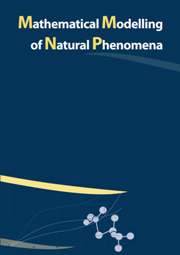No CrossRef data available.
Article contents
Intensified Doxorubicin-Based Regimen Efficacy inResidual Non-Hodgkin's Lymphoma Disease:Towards a Computationally SupportedTreatment Improvement
Published online by Cambridge University Press: 15 June 2008
Abstract
Despite recent advances, treatment of patients with aggressive Non-Hodgkin'slymphoma (NHL2) has yet to be optimally designed. Notwithstanding the contribution ofmolecular treatments, intensification of chemotherapeutic regimens may still be beneficial.Hoping to aid in the design of intensified chemotherapy, we put forward a mathematicaland computational model that analyses the effect of Doxorubicin on NHL over a widerange of patho-physiological conditions. The model represents tumour growth both indiffusion-limited settings, that is, in small avascular tumours and tumour cords, and inperfusion-limited settings, e.g. in well-vascularized tumours. Model simulations indicatedthe presence of a critical regimen intensity below which treatment will fall short of tumourelimination. Taking this critical intensity into account, we compared two regimenintensification strategies: Dose escalation and regimen densification, i.e. reducing theinter-dosing interval. In the diffusion-limited setting, dose escalation was somewhat moreefficient than regimen densification. In the perfusion-limited setting, both intensificationstrategies yielded similar results. The present study coupled with a realistic myelotoxicitymodel may add insight on the optimisation of NHL intensified chemotherapy design.
Keywords
- Type
- Research Article
- Information
- Mathematical Modelling of Natural Phenomena , Volume 2 , Issue 3: Cancer modelling , 2007 , pp. 47 - 68
- Copyright
- © EDP Sciences, 2007


